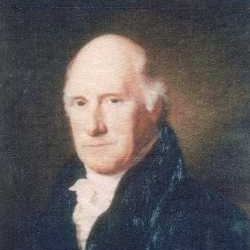
Robert Mott 1764 -1843
'a well fed, shrewd, humorous man with a touch of cunning'
Eric Alston Mott, 1982
In the early 1700s there was a flourishing Baptist Community in Ditchling. Around twenty five families were reported to be members of the newly built Chapel in the Twitten, financed by Robert Chatfeild of Streat. Acceptance of those not following the teachings of the Established Church was not however widespread and many Baptists suffered persecution for their beliefs. In consequence they developed the practice of marrying and conducting business within their own community. Robert Mott’s life story is just one example of what life was like for a Baptist at the time.
Robert Mott was born in Chichester in 1764. In the same year his father, Isaac, was invited to assist the Ditchling Chapel in their ministry. His mother, Sarah Chatfeild, also had links to Ditchling being the grand-daughter of Robert Chatfeild mentioned above. Robert Mott lived in Ditchling for about ten years before his father moved again, this time to the Cuckfield Baptist Chapel. However, Robert's connection to Ditchling had been established and the Chapel records note that 'Robert Mott of Brighton' was formally admitted to the Chapel in 1789. Three years later, in 1791, he married Anne Chatfeild at St Andrew’s Church in Holborn, London. Robert would have been about 27 years old and his wife 48. While this age difference is somewhat surprising to us, it probably would not have been regarded as quite so unusual at the time. We also learn that Anne was one of Robert’s mother’s cousins.
Mott family descendants have provided a copy of Robert's portrait (above) which they describe as showing a ‘well fed, shrewd, humorous man with a touch of cunning.’ He was undoubtedly a successful businessman purchasing North End and East End Farms in Ditchling in 1829 as well as numerous properties in Brighton which became his main home. His life was not however without adventure and much sadness.
Robert was the second son from his father’s second marriage and he had five older half-brothers. Faced with persecution of his religious and political beliefs, one of the half-brothers, William, had taken his wife and children and emigrated to America. Within the year however he and his wife died from yellow fever. In 1795, Robert made the difficult journey across the Atlantic to bring five of William’s six orphaned children home. The eldest, aged 13, remained. Back in England, the children were raised by various members of the family; Robert took two of the children, Julius and his sister, Martha. Later Martha also lived with Robert’s younger brother, George, and his wife in Westmeston.
In 1822, Robert’s wife, Anne, died and on 25th August 1823 he married again, this time in Crediton in Devon. His second wife was none other than his niece, Martha. Again there was a significant difference in their ages, Martha being some 27 years younger than Robert. The marriage caused considerable upset within the family, some refusing to accept that the marriage was legal. A diary written by Eliza Mott, Julius’ wife, records that the marriage had been kept secret until Martha wrote early one spring ‘startling us by the statement that she had been married several years to our Uncle Robert Mott, and that they were in great sorrow having just lost their first born child, a girl, and that ever since the birth of her second, a boy born 20 September 1828, she had been an invalid with erysipelas in the face, and indeed all over her; that she longed to come to us once more, but that I must be prepared for a terrible change. And terrible it was; all her beauty gone, her face frightfully disfigured.’
Martha was indeed extremely ill causing Eliza to record Robert’s ‘devoted anxiety’ towards his young wife. For a while Martha made a brief recovery but died shortly after this visit. Her last request was that her son Mentor be brought up by Eliza and Julius in Loughborough with their own young family. Robert was devastated at the loss of his wife and according to Eliza rarely visited his son.
Robert died in Brighton in 1843, aged 79 years and was buried in the Ditchling Baptist Burial Ground in the Twitten. To his son, Mentor, he left his two Ditchling farms together with over twenty properties in Brighton, to be held in trust until his twenty-fifth birthday.